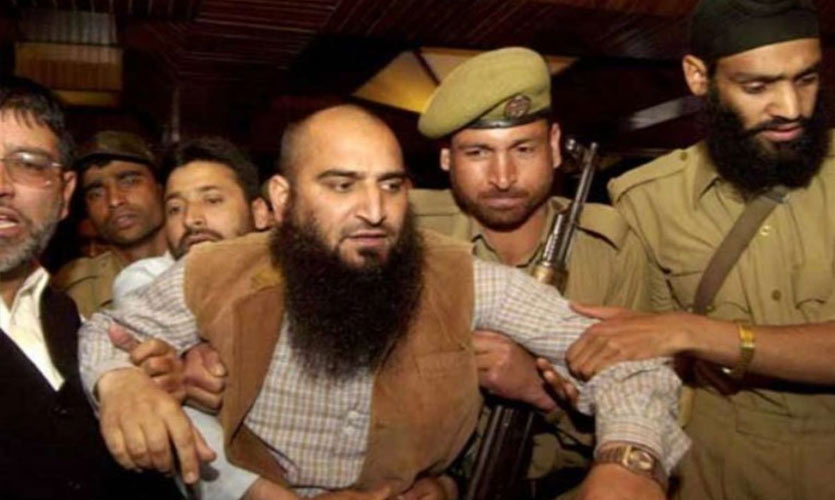Days after the demise of Kashmir’s staunchest separatist leader, Syed Ali Shah Geelani who died on September 1 due to age related ailments, the separatist All Parties Hurriyat Conference (APHC) has appointed Masarat Alam as the new chairman. He is currently behind bars in Delhi’s Tihar Jail for terror-funding.
In a statement, the APHC said that the decision was taken at a meeting held in Srinagar. “Considering the challenges, Hurriyat members have consulted through different mediums and have unanimously agreed that Masrat Alam Bhat will be made the chairman,” read the statement. The APHC claims that the people of Jammu and Kashmir look up to its leadership with great expectations.
Shabbir Ahmad Shah and Ghulam Ahmad Gulzar are slated to be the vice-chairmen while Moulvi Bashir Ahmad Irfani will continue to work as the general secretary of the amalgam.
Masarat Alam is currently imprisoned in Tihar Jail. He has served more than 20 years of cumulative jail terms since the 1990s. His strong influence over the people of Kashmir and his separatist ideology that supports Kashmir’s merger with Pakistan is often looked upon as the strongest critique of New Delhi. Alam enjoys the image of a firebrand leader among his supporters.
Known for his close attachment to Pakistan, Alam is infamous for his role in the 2010 agitation in the Kashmir valley against the Machil encounter carried out by the Indian security forces. The unrest resulted in the deaths of 120 youths and left many others injured. A bounty of ₹10 lakhs was announced for any information about his whereabouts. Alam was arrested on the outskirts of Srinagar city after a four-month search.
He has been charged under the harsh Public Safety Act (PSA) 37 times. Successive state governments have slapped the PSA on him from time to time to keep him in jail in order to avoid any more disturbance. Alam was charge sheeted again by the National Investigation Agency (NIA) in October 2019. Immediately after his arrest, the NIA said, “Muslim League chairman Masarat Alam Bhat revealed in the investigation that Pakistan-based agents routed funds through Hawala operators and these were transferred to separatists, including Syed Ali Geelani.”
“Bhat said that there were rifts in the Hurriyat over the funds,” said the agency. Though Geelani was elected as the lifetime chairman of the APHC, he stepped down from the post last year after rifts over certain appointments. Since then, Alam, who enjoyed a cordial relationship with Geelani, was looked upon by many as the new face of the Hurriyat.
In the 1990s, when militancy in Kashmir was at its peak, Alam had joined the pro-Pakistan militant outfit Hezbollah. But after his arrest and subsequent release he joined the separatist Muslim League and became a firebrand critique of New Delhi’s role in Kashmir. In 2013, the Hurriyat Conference broke into two groups – hardliners and moderates. Alam joined the former and was briefly appointed general secretary of the Hurriyat Conference when several of its leaders were arrested.
Alam openly propagates stone pelting as the only form of resistance. In an interview with the Indian Express, he said, “Kashmir is under occupation, and there will be no debate or discussion on that.”
Read more: Surge In Foreign Militants In Northern Kashmir Amid The Taliban’s Takeover Of Afghanistan
The Taliban’s announcement of the interim government in Afghanistan is also worrying. The new cabinet not only includes members of the Taliban but also the Haqqani network, which is known for its anti-India rhetoric. The inclusion of Haqqani network members in the cabinet is being viewed with suspicion and anxiety by New Delhi. The group was responsible for the terror attack on the Indian Embassy in Kabul in 2008, and several other attacks targeting Indian interests in Afghanistan. The Haqqani network also enjoys close links with Pakistan’s intelligence agency ISI, who is also said to support and fund militants groups in Kashmir from across the border.
Looking at the current situation in Kashmir valley, a very difficult road seems to lie ahead for the Hurriyat. Apart from Masarat Alam, many other APHC leaders are lodged in jail in different parts of the country, or are under house-arrest. The vacuum left after the abrogation of Article 370 and amendment of Article 35A is yet to be filled. The prevailing situations in Afghanistan have increased security concerns in the Kashmir valley and therefore, it seems that the future of the Hurriyat hangs in uncertainty.










